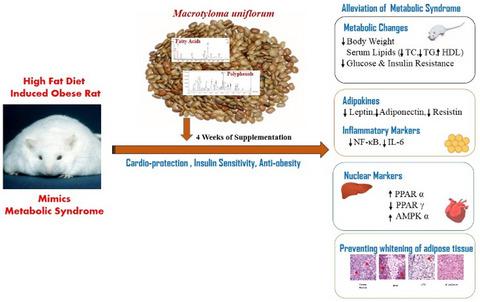当前位置:
X-MOL 学术
›
J. Food Biochem.
›
论文详情
Our official English website, www.x-mol.net, welcomes your feedback! (Note: you will need to create a separate account there.)
Macrotyloma uniflorum a plant food alleviates the metabolic syndrome through modulation of adipokines and PPARs
Journal of Food Biochemistry ( IF 4 ) Pub Date : 2020-12-23 , DOI: 10.1111/jfbc.13595 Malarvizhi R 1 , Sugumar Mani 1 , Veeresh K Sali 1 , Meenakshi Bhardwaj 1 , Hannah R Vasanthi 1
Journal of Food Biochemistry ( IF 4 ) Pub Date : 2020-12-23 , DOI: 10.1111/jfbc.13595 Malarvizhi R 1 , Sugumar Mani 1 , Veeresh K Sali 1 , Meenakshi Bhardwaj 1 , Hannah R Vasanthi 1
Affiliation

|
A sedentary lifestyle combined with the intake of high‐calorie diet has been the paramount cause of metabolic syndrome (MS) which is now a serious concern of public health worldwide as it involves the coexistence of hypertension, hyperlipidemia, glucose intolerance, and obesity. Hence, identifying a suitable strategy to overcome the worldwide menace of MS is imperative. Macrotyloma uniflorum a lesser known legume is highly nutritious and notable for its ethano‐medicinal potential. Herein, the influence of M. uniflorum in high‐fat dietinduced metabolic changes in a rodent model of metabolic syndrome was evaluated. Serum levels of glucose, total cholesterol, triglycerides, VLDL‐c, and bodyweight were decreased, whereas HDL‐c was increased in M. uniflorum‐treated MS rats. The protein expression (AMPK‐α, PPAR‐α, and PPAR‐γ) and gene expression (leptin, adiponectin, resistin, UCP2, NF‐κB, and IL‐6) results are impressive to highlight that M. uniflorum modulates the pathological conditions of MS and proves to be cardioprotective. Furthermore, the histopathological analysis confirmed the pathological changes and substantiates the influence of M. uniflorum to overcome MS. The HPLC and GC (MS) profiling reveals the presence of an array of polyphenols such as rutin (694.61 μg/g), catechin (500.12 μg/g), epicatechin (158.10 μg/g), gallic acid (17.98 μg/g), ferulic acid (10.911 μg/g), daidzein (6.51 μg/g), and PUFA, respectively, which probably exhibits the therapeutic effect on MS and associated complications by modulating lipid metabolism and adipogenesis.
中文翻译:

植物性单花巨噬细胞通过调节脂肪因子和PPAR减轻代谢综合征
久坐不动的生活方式与摄入高热量饮食一直是代谢综合征(MS)的首要原因,而代谢综合征由于涉及高血压,高脂血症,葡萄糖耐受不良和肥胖症的并存,现在已成为全世界公众健康的重要问题。因此,必须找到一种合适的策略来克服MS的全球威胁。豆荚大单胞菌(一种鲜为人知的豆科植物)具有很高的营养价值,并具有其在种族医学上的潜力。这里,影响M.芦高脂dietinduced在代谢综合征的啮齿动物模型的代谢变化进行评价。葡萄糖,总胆固醇,甘油三酯,VLDL-C,和体重的血清水平下降,而HDL-C的增加M. uniflorum-治疗的MS大鼠。蛋白质表达(AMPK-α,PPAR-α和PPAR-γ)和基因表达(瘦素,脂联素,抵抗素,UCP2,NF-κB和IL-6)的结果令人印象深刻,突出了独花支原体可调节病理并证明具有心脏保护作用。此外,组织病理学分析证实了病理变化并证实了M. uniflorum的影响。克服MS。HPLC和GC(MS)分析表明存在多种多酚,如芦丁(694.61μg/ g),儿茶素(500.12μg/ g),表儿茶素(158.10μg/ g),没食子酸(17.98μg/ g) ,阿魏酸(10.911μg/ g),黄豆苷元(6.51μg/ g)和PUFA可能通过调节脂质代谢和脂肪形成对MS及其相关并发症具有治疗作用。
更新日期:2021-02-22
中文翻译:

植物性单花巨噬细胞通过调节脂肪因子和PPAR减轻代谢综合征
久坐不动的生活方式与摄入高热量饮食一直是代谢综合征(MS)的首要原因,而代谢综合征由于涉及高血压,高脂血症,葡萄糖耐受不良和肥胖症的并存,现在已成为全世界公众健康的重要问题。因此,必须找到一种合适的策略来克服MS的全球威胁。豆荚大单胞菌(一种鲜为人知的豆科植物)具有很高的营养价值,并具有其在种族医学上的潜力。这里,影响M.芦高脂dietinduced在代谢综合征的啮齿动物模型的代谢变化进行评价。葡萄糖,总胆固醇,甘油三酯,VLDL-C,和体重的血清水平下降,而HDL-C的增加M. uniflorum-治疗的MS大鼠。蛋白质表达(AMPK-α,PPAR-α和PPAR-γ)和基因表达(瘦素,脂联素,抵抗素,UCP2,NF-κB和IL-6)的结果令人印象深刻,突出了独花支原体可调节病理并证明具有心脏保护作用。此外,组织病理学分析证实了病理变化并证实了M. uniflorum的影响。克服MS。HPLC和GC(MS)分析表明存在多种多酚,如芦丁(694.61μg/ g),儿茶素(500.12μg/ g),表儿茶素(158.10μg/ g),没食子酸(17.98μg/ g) ,阿魏酸(10.911μg/ g),黄豆苷元(6.51μg/ g)和PUFA可能通过调节脂质代谢和脂肪形成对MS及其相关并发症具有治疗作用。



























 京公网安备 11010802027423号
京公网安备 11010802027423号